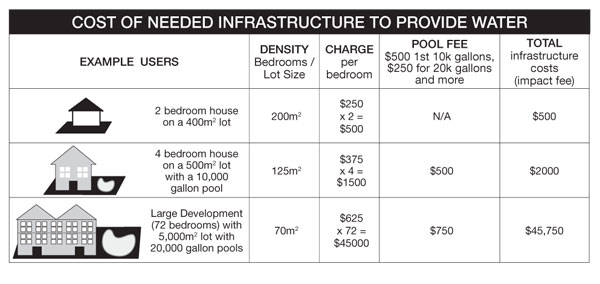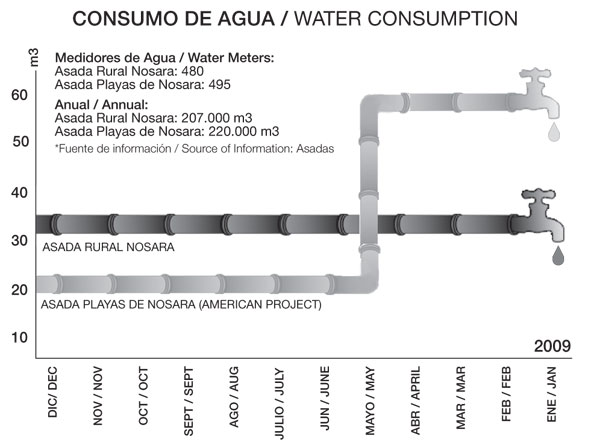The four hundred and ninety five users affiliated to the Administrative Association of the Aqueduct and Sewer System of Nosara (ASADA) saw a decrease in their water bill from the month of January because the ASADA had to apply the official rates established by the Regulating Authority of Public Utilities (ARESEP) that applies to all the rural water boards.
The ARESEP resolution of December 20th, 2002, RRG-2912-2002, permitted the charge of a base rate of ¢19.418 and ¢239 for each additional cubic meter consumed above the base of sixteen cubic meters, and $350 for new services. Now with the new rates, each user must pay a base rate of ¢2.050, ¢110 for each additional cubic meter and ¢96.705 (about $170) for a new connection – according to the amount of users table. The price of the connection includes the cost of the pipe which goes from the main network to the property of the client.
However, since 2006, the ASADA has been charging a new connection fee that can vary from one thousand five hundred dollars to as much as seven thousand as dictated by a formula of environmental impact. This formula estimates the impact size of the new development on water pumping infrastructure and charges fees accordingly.
Rick Walker, president of the ASADA, says that “We created the formula so that the same criteria for fees is applied to all clients equally, not like before 2006 when the price of the environmental impact was arbitrary”.
The impact fee, which bases charges on the size of the building and the number of bedrooms, is unauthorized according to ARESEP which contends that all additional charges by an ASADA must be approved by their agency.
ARESEP Spokeswoman Carolina Mora stated that in 2002 the Civic Association of Nosara (ACN), was operating as a private water board by means of resolution 258-A-91 of July 23, 1991. It used rates that they themselves set. but, then became the ASADA and since that time had to be adjusted to the authorized rates.
Last November ASEREP issued its decision on requirement for the Guiones ASADA to charge the standard water fees as a result of a complaint from a Nosara resident about the high rates.
In the meantime, in order to meet the expenses of water delivery, the Guiones ASADA asked water users to voluntarily continue paying their surcharge on top of the official rates: This is a voluntary contribution that is not obligatory. As of January 20th, 395 users decided to make the contribution; the remainder refused to pay it or had already paid their bill.
Walker said that if the voluntary fees were not paid, the ASADA would be forced to suspend capital projects including the digging of a new well and the building of a new tank.
The ASADA might also be forced to reduce its staff of plumbers, jeopardizing a reputation for good service, Walker said.
“The ASADAS have had important pricing adjustments, so that they can invest in projects. But, if the ASADA sees that it has very high and important expenses, then it needs to ask for authorization of the AyA and request a rates adjustment. There have to be studies by official Geologists that indicate that there are problems. What they should do is adjust to the budget they have and lower costs”, explained Carolina Mora, spokesman of ARESEP.
In Nosara there is a lot of confusion since there is a rumor that the AyA might assume control of the water board. This has been denied by the hierarchy of this public entity Ricardo Sancho, “for the moment the ASADA has not presented symptoms that it is working poorly, hence, it is not necessary to do an intervention” assured Sancho.


 |
|

